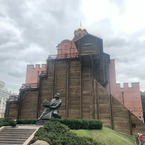The research project builds on a previous project which was funded by the Volkswagen Stiftung and extends and deepens the insights already gained. It dives deep into a comparative analysis of knowledge and technology transfer and the institutional voids for the development of innovative capabilities in regional innovation systems in Russia (Krasnoyarsk) and Ukraine (Kyiv) in comparison to Germany. It focus particularly on opportunities, trust, incentives and institutional voids as special facilitators or prohibiting factors of knowledge exchange on the national as well as on the regional level. A profound understanding of regional innovation systems and the institutional voids in transition economies enable delivery of highly relevant input for informed policy advice and for economic policies improving the innovative capabilities and thereby the growth opportunities of these countries.For many countries – like Germany, Japan, South Korea, Taiwan or Singapore - innovation has been central for positive economic development in the past. Alternatively, a lack of innovation effort and innovation outcomes can be frequently associated with a country’s inferior economic development. Knowledge flows within national systems of innovations are seen as critical for the generation of innovation.
The preliminary results from our previous VW-Stiftung research project show that the three cases (Russia, Ukraine, and Germany) are sufficiently similar yet at the same time happen to be sufficiently different to allow meaningful comparisons. In this short-term research project, we focus on extending, exploring, exploiting and disseminating the obtained results derived from our previous research project. In particular, we learned that there are issues related to trust, incentives, transparency, opportunities and specific institutional voids that affect the knowledge exchange inside these regional and national innovation systems. Commonalities and differences between the three regional innovation systems in Krasnoyarsk, Kyiv, and Baden-Württemberg, are explored, and theorized in greater detail. Based on the results from qualitative work, the projects purposes to develop a deep understanding about the functioning of markets, system and transformational system failures regarding the generation of innovation in the regional innovation systems. It also aims to consider additional sets of explanatory factors on the micro-, meso- and macro-level which have not been investigated so far. The project includes joint work on additional data collection and data analysis as well as exploitation of research results in terms of publications.









